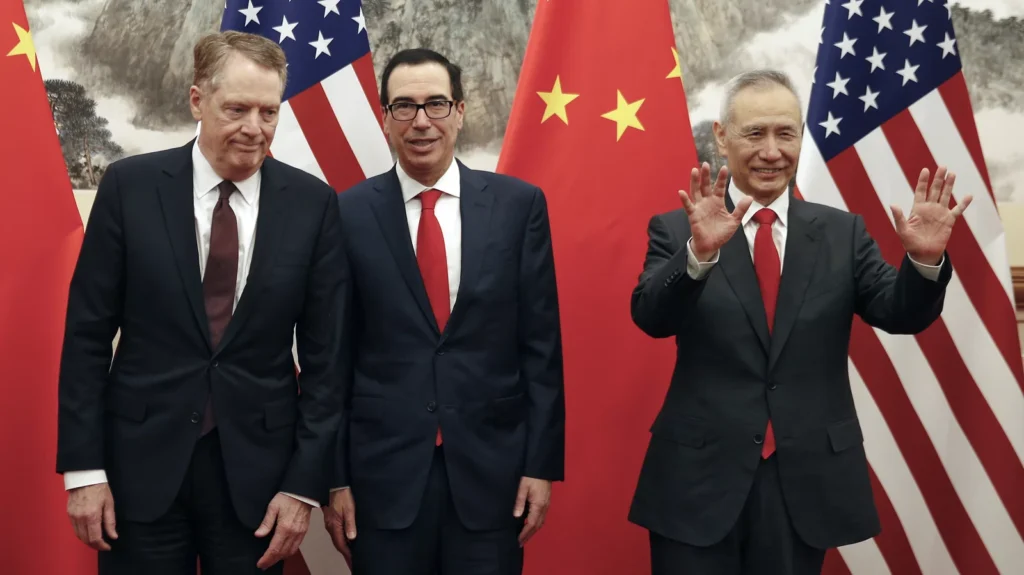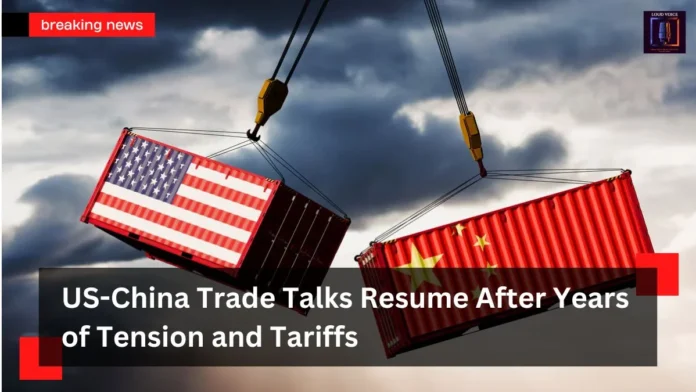Key Takeaways
- US-China trade talks are resuming for the first time since Trump’s aggressive tariff hikes.
- Top officials from both nations are meeting in Switzerland to address longstanding economic disputes.
- One of the most significant international trade stalemates may begin to ease as a result of the negotiations.
- Both sides face mounting economic pressure from industries and consumers to find common ground.
- Experts suggest even limited progress could deliver significant economic and political benefits.
US-China Trade Talks Resume Amid Rising Economic Pressures
In a long-awaited move that could reshape global economic dynamics, the United States and China are returning to the negotiating table for the first formal U.S.-China trade talks since the Trump administration-imposed triple-digit tariffs on Chinese goods. The historic meeting is taking place in Geneva, Switzerland, and could signal a new chapter in one of the most fractious economic relationships of the 21st century.
Treasury Secretary Scott Bessent and U.S. Trade Representative Jamieson Greer are spearheading the American delegation, while He Lifeng, China’s vice premier for economic policy, is leading the talks for Beijing. While optimism is cautious, the stakes could not be higher.
A Tense Backdrop: Tariffs, Trade Wars, and Diplomatic Chill
This meeting comes on the heels of a tumultuous trade relationship that escalated dramatically during former President Donald Trump’s first term. In April, Trump reignited tensions by raising tariffs on Chinese exports to a staggering 145% minimum, blaming China for retaliation and a range of grievances including the fentanyl crisis and failure to comply with prior trade agreements.
In response, Beijing called the tariffs “illegal and unreasonable,” effectively freezing trade between the two superpowers and prompting businesses on both sides of the Pacific to sound the alarm. According to recent trade data, U.S. imports from China have plummeted to their lowest levels in over two decades.
Why Geneva, and Why Now?
Geneva was chosen as neutral ground, symbolizing a fresh start for dialogue. Swiss President Karin Keller-Sutter is also slated to meet with both delegations to explore future cooperation, possibly even a tri-lateral trade arrangement. This adds another layer of diplomatic weight to the already high-stakes encounter.
Secretary Bessent stated to a News Agency that the discussions would take place over the weekend. “A level playing field is something that the American people and our industries deserve. We’re here to find solutions, not just exchange talking points,” he said.
Economic Stakes: Pressure From All Sides
American companies have increasingly voiced their frustration, warning that prolonged tariffs threaten jobs, supply chains, and competitiveness. “Trade has stopped,” a U.S. manufacturing executive who wished to remain anonymous said. “We are in danger of losing important markets.”
The Chinese Ministry of Commerce has acknowledged receiving multiple overtures from Washington aimed at reopening negotiations. A spokesperson stated that China chose to enter the negotiations after carefully considering international expectations, its national interests, and growing pressure from U.S. businesses and consumers.
This statement reflects a rare alignment of interests: both governments are feeling pressure from domestic industries to ease tensions and restore predictable economic relations.
What’s on the Table?
While neither side has publicly detailed their negotiation positions, several issues are expected to dominate the agenda:
- Reduction or removal of the 145% U.S. tariffs
- China’s alleged violations of previous trade agreements
- Intellectual property rights enforcement
- The fentanyl supply chain and export regulation
- Reciprocal market access for American and Chinese companies
A senior official familiar with the talks suggested that while a comprehensive deal is unlikely in this initial round, incremental agreements or confidence-building measures—such as a tariff freeze—could be realistic short-term goals.
Mutual Interests, Lingering Distrust

Despite the mounting pressure to reach an agreement, trust remains fragile. China has demanded that the U.S. “correct its wrong practices” and conduct talks based on fairness and equality. Meanwhile, Trump and his advisors maintain a hardline stance, insisting that China must first show good faith by complying with previously agreed-upon terms.
Even so, analysts see a window of opportunity.
Former International Monetary Fund official and Cornell University professor Eswar Prasad said, “This is a very encouraging step. Even though a full-fledged agreement is not yet forthcoming, the mere act of resuming talks helps to defuse tensions and demonstrates that both parties are committed to de-escalation.
Geopolitical Ripple Effects
The resumption of U.S.-China trade talks is also being closely watched by global markets and U.S. allies. Canada, the European Union, and key Asian economies have all expressed support for the talks, with many quietly hoping they will stabilize a volatile global trade environment.
During a joint press event with Canadian Prime Minister Justin Trudeau, President Trump acknowledged the pressure on China to re-engage. “They want to meet—they’re doing no business right now,” he said, underscoring how deeply the trade war has impacted Chinese exports.
The Path Forward: Cooperation or Confrontation?
With each side cautiously optimistic yet wary of concessions, the outcome of these talks may set the tone for international trade in the years ahead. Industry leaders, economists, and global policymakers will be watching closely to see whether the world’s two largest economies can finally find common ground—or if the cycle of escalation will continue.
While the Geneva meeting may not yield an immediate resolution, it is undeniably a pivotal moment. Even modest progress could restore some trust and pave the way for broader negotiations in the future.
Conclusion
The renewed U.S.-China trade talks in Geneva offer a glimmer of hope after years of hostility and economic disruption. While the road to a full agreement remains long and uncertain, this first step toward dialogue is meaningful. For industries, consumers, and global markets alike, even a partial thaw in relations could provide much-needed relief. In a world increasingly defined by economic interdependence, the ability to talk—and listen—may be the most powerful trade tool of all.


